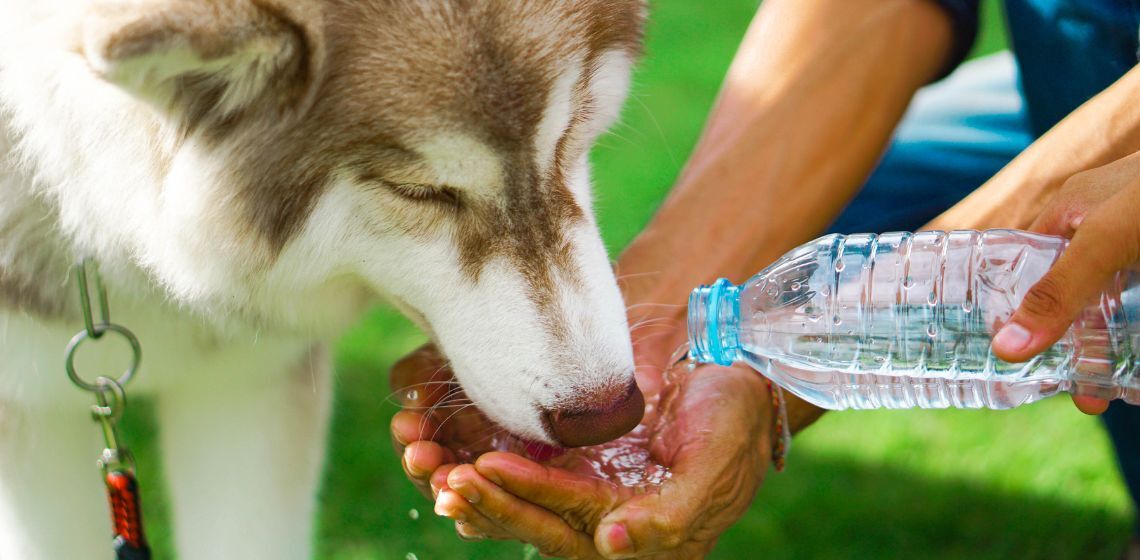Introduction
As our beloved canine companions enter their golden years, it’s not uncommon for pet owners to notice a shift in their dogs’ drinking habits. An older dog drinking a lot of water might not seem like a cause for alarm at first glance, but this change can be indicative of underlying health issues or natural age-related adjustments in your dog’s needs. Understanding and closely monitoring your older dog’s water consumption is crucial because it can be an early warning sign of several conditions, ranging from benign to serious. This article aims to provide a comprehensive look at why increased thirst occurs in senior dogs, the importance of keeping track of hydration levels, and when it might be time to consult your veterinarian for a professional assessment. By staying informed and observant, pet owners can ensure their senior pets maintain optimal health and comfort in their later years.
Recognizing the Signs
Detecting whether your older dog drinking a lot of water than usual requires a vigilant eye and an awareness of their normal habits. An increase in the refill frequency of their water bowl or more frequent trips to their drinking spot can be initial clues. You might also observe that your dog’s urination is more frequent, larger in volume, or that there is an increase in accidents within the home.
Excessive thirst in older dogs may present alongside other symptoms that warrant attention. Panting, which could be more pronounced than what’s typical for your dog, especially in cool conditions or during rest, is one such sign. Other symptoms that might accompany increased water intake include changes in appetite, lethargy, or a sudden shift in weight — either loss or gain. It’s essential to note these signs and discuss them with your vet, as they can be crucial in diagnosing potential health issues early on.
Common Causes of Increased Thirst
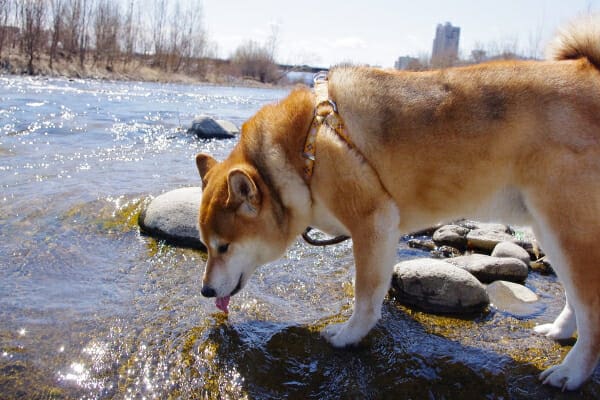
As dogs enter their senior years, changes in their drinking habits can be a telltale sign of various conditions, and understanding the distinction between normal age-related changes and symptoms of disease is vital. Some older dogs may naturally seek more water due to a decrease in their body’s ability to conserve water effectively. However, when an older dog is drinking a lot of water, it may also be indicative of polydipsia, which is often associated with several health issues.
- Kidney Disease: In senior dogs, kidney function can deteriorate, leading to less effective water conservation and an increased need to drink.
- Diabetes Mellitus: This condition disrupts normal glucose metabolism, causing your dog to drink more in an attempt to balance blood sugar levels.
- Liver Disease: The liver is crucial for detoxification and metabolism. When it’s not functioning properly, symptoms may include increased thirst.
- Cushing’s Disease: This endocrine disorder, characterized by an overproduction of cortisol, often leads to a significant increase in thirst and appetite.
- Medications: Certain medications can have side effects that include increased thirst. For example, drugs used to treat conditions such as allergies or inflammation can lead to a noticeable uptick in water intake.
Behavioral and Environmental Factors
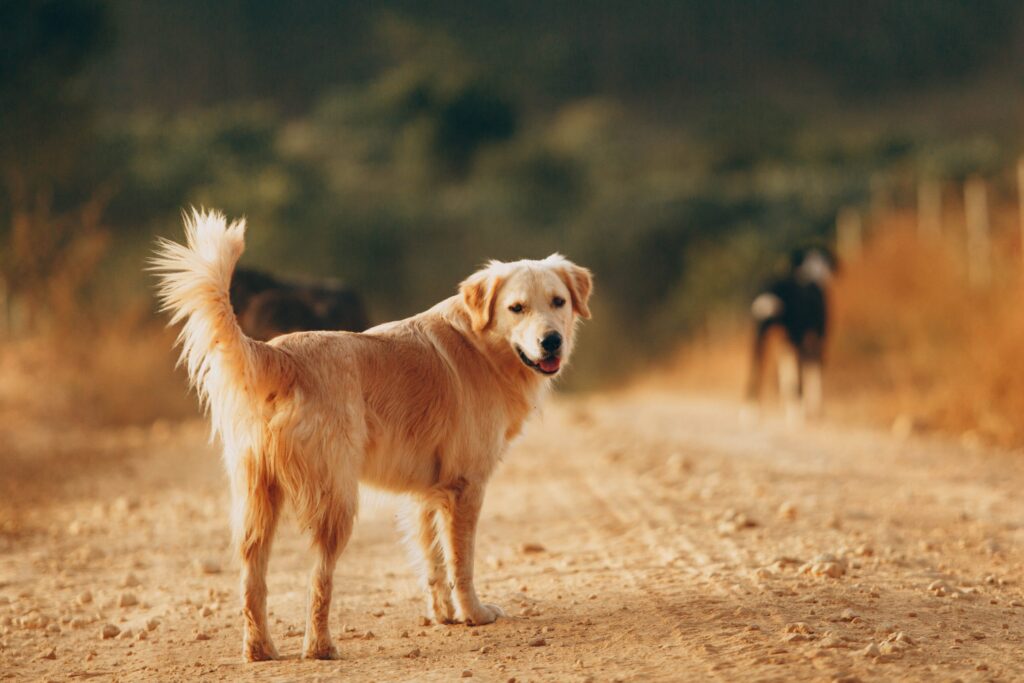
When evaluating an older dog drinking a lot of water, it’s essential to consider not only medical causes but also behavioral and environmental factors that may influence their hydration needs.
- Changes in Diet or Environment: A switch to a diet with higher salt content, for instance, can lead to increased thirst. Similarly, changes in your home such as the use of heating or air conditioning can affect your dog’s water consumption.
- The Role of Exercise and Temperature: As with humans, an increase in exercise or a rise in ambient temperature can make your dog thirstier. It’s important to note whether the increased water intake correlates with these factors.
- Stress and Anxiety: Emotional factors can play a role in your dog’s drinking habits. Dogs experiencing stress or anxiety may drink more water as a coping mechanism or due to stress-induced dry mouth.
Each of these factors can influence an older dog’s thirst and should be considered when assessing changes in their drinking behavior. If environmental factors are contributing to your older dog losing weight or showing signs of distress, adjustments may be needed to create a more comfortable and supportive setting for them. Consulting with a veterinarian can provide insights into managing these factors effectively, ensuring your senior dog’s environment and lifestyle promote optimal health.
Further Reading:
Older Dog Losing Weight: Causes, Diets, and Care Tips
from https://myolderdog.com/dog-treatment/older-dog-losing-weight/
Diagnosis and Veterinary Perspective
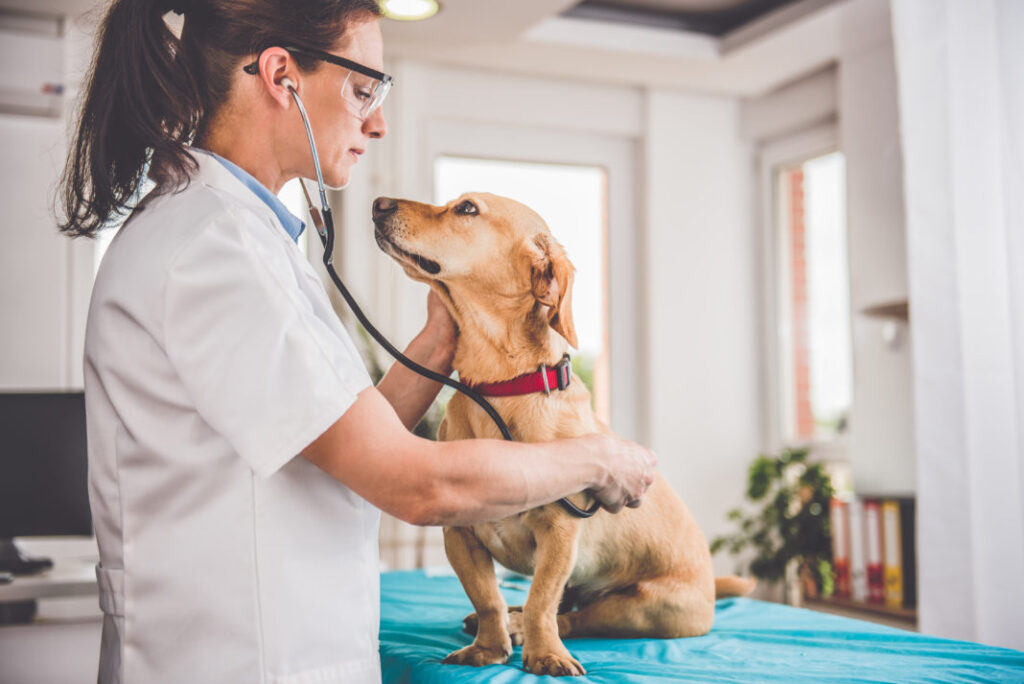
When an older dog drinking a lot of water, a thorough veterinary assessment becomes an essential step in determining the cause and ensuring proper care. Understanding the importance of a veterinarian’s perspective can help pet owners prepare for what to expect and appreciate the value of professional diagnostics.
- The Importance of Veterinary Assessment: Veterinary expertise is invaluable when it comes to interpreting the signs of increased thirst in senior dogs. Veterinarians can differentiate between the wide array of potential causes, from benign environmental factors to serious health conditions. They will evaluate not just the symptom of increased thirst, but also other vital information such as changes in weight, appetite, or behavior.
- What to Expect During the Vet Visit: During the visit, the veterinarian will perform a comprehensive physical examination and review the dog’s medical history, including any recent changes in diet, environment, and behavior. Pet owners should be ready to provide details about their dog’s water intake, diet, and any other observed changes. It’s helpful to note when the increased thirst began and whether it has been constant or intermittent.
- Diagnostic Tests That May Be Conducted: To pinpoint the cause of polydipsia, veterinarians may recommend several tests. These can include blood work to assess kidney and liver function, check for diabetes, and evaluate overall health. A urinalysis can help determine the kidney’s ability to concentrate urine and check for signs of infection or other abnormalities. Additional diagnostic imaging such as X-rays or ultrasounds may be necessary if the vet suspects specific organ issues or tumors. In some cases, more specialized tests like an ACTH stimulation test for Cushing’s disease may be performed.
Through these assessments, veterinarians can offer a tailored approach to treatment that may include dietary management, medication, or other interventions. Regular follow-ups may be needed to monitor the dog’s response to treatment and adjust as necessary, ensuring the best possible outcome for the older dog’s health and quality of life.
Special Considerations for Older Female Dogs
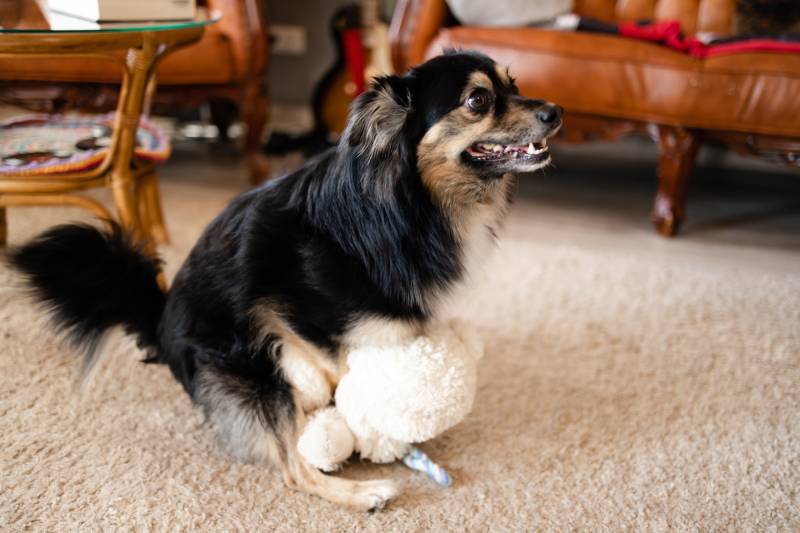
Older female dogs may have additional factors to consider when it comes to changes in drinking habits. Hormonal fluctuations, particularly in those that are not spayed, can significantly impact hydration and overall health.
- Hormonal Fluctuations: The estrous cycle in female dogs that have not been spayed can cause periods of increased thirst. Conditions such as pyometra, a serious uterine infection that can develop after a heat cycle, can also lead to increased water consumption. Another hormone-related condition to be aware of is hypothyroidism, which can affect metabolism and subsequently drinking habits.
- Unique Health Concerns: Spayed female dogs have a reduced risk of hormone-related diseases; however, they may still develop conditions that influence thirst as they age. For instance, mammary tumors, whether benign or malignant, can occur and affect the overall health of older female dogs. Additionally, age-related incontinence can sometimes lead older dog drinking a lot of water, feels they need to replenish lost fluids.
Monitoring the hydration levels and overall health of an aging female dog is essential. Veterinary check-ups are particularly important for early detection and treatment of breed-specific and gender-specific conditions. Pet owners should consult with their veterinarians to understand the best practices for managing the health of their older female dogs, including considering the pros and cons of spaying and regular screenings for common ailments.
Further Reading
Aging in Dogs: Physical and Mental Signs Your Dog Is Getting Older
From https://www.akc.org/expert-advice/health/aging-in-dogs-physical-mental-signs/
Managing and Treating Excessive Thirst
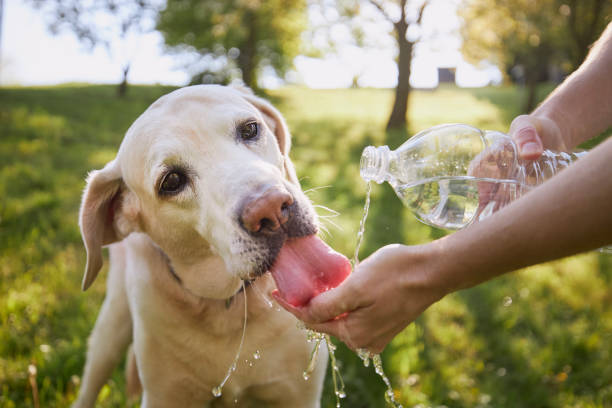
Effectively managing and treating excessive thirst in older dogs involves a comprehensive approach that may include environmental adjustments, dietary changes, medical interventions, and the ongoing management of any chronic conditions. Tailoring these strategies to meet the specific needs of your senior dog can help ensure they remain healthy and hydrated.
- Adjusting Your Older Dog’s Environment and Routine: Simple changes in the living environment and daily routine can help manage thirst. Ensure that fresh, clean water is always available and easily accessible. Consider placing multiple water stations around your home to encourage drinking. Additionally, maintaining a consistent routine, including regular feeding times and controlled exercise, can help regulate thirst and prevent dehydration.
- Dietary Modifications: For an older dog drinking a lot of water, dietary changes can be beneficial. Consult with your veterinarian to select a diet that supports your dog’s specific health needs, particularly if they have been diagnosed with a condition like kidney disease or diabetes. Diets formulated for senior dogs often have adjusted nutrient profiles, including increased omega-3 fatty acids, antioxidants, and appropriate levels of protein to support kidney function and overall health.
- Medical Treatments for Underlying Causes: If a specific health issue is causing your older dog to drink more water, treating the underlying cause is crucial. This may involve medications to manage conditions such as diabetes or Cushing’s disease. Always follow your veterinarian’s guidance regarding medications and treatment plans, as proper management can significantly impact the health condition of your older dog drinking a lot of water.
- Ongoing Management of Chronic Conditions: Chronic conditions like kidney disease require ongoing management to maintain quality of life. Regular veterinary check-ups, monitoring blood work, and adjusting treatment plans as needed are essential. Additionally, providing a supportive home environment that includes easy access to water and comfortable resting areas can help your older dog manage their condition more effectively.
Home Care and Monitoring

Caring for an older dog drinking a lot of water involves attentive home care and diligent monitoring. By keeping a close eye on their water intake and ensuring they remain properly hydrated, pet owners can play a crucial role in their senior dog’s health. Here are some tips for effective home care and knowing when to seek veterinary advice.
- Tips for Monitoring Your Dog’s Water Intake: Start by measuring the amount of water you put in your dog’s bowl to track how much they drink each day. A sudden increase or decrease in this amount can be a sign of health issues. Keep a journal or log of daily water intake, noting any changes in behavior or appetite as well. This information can be invaluable during veterinary visits.
- Encouraging Proper Hydration: Ensure that fresh, clean water is available at all times and that your dog has easy access to it. Consider placing multiple water bowls throughout your home, especially if your dog has mobility issues. For dogs that may be less inclined to drink enough water, incorporating wet food into their diet or adding water to their dry food can help increase their fluid intake.
- When to Contact Your Veterinarian: If you notice any significant changes in your dog’s drinking habits, whether they are drinking more or less than usual, it’s important to contact your veterinarian. Also, be alert for signs of dehydration (such as dry gums, lethargy, or sunken eyes) or overhydration (which can include vomiting, bloating, or lethargy). Other symptoms that warrant a vet visit include changes in urination patterns, appetite, weight, or behavior. Early detection and treatment of potential health issues can significantly impact your dog’s well-being.
Conclusion
Understanding and addressing the reasons behind an older dog drinking a lot of water is paramount for their health and well-being. As dogs age, changes in their drinking habits can signal various conditions, from normal age-related adjustments to more serious health issues such as kidney disease, diabetes mellitus, or Cushing’s disease. Recognizing these signs early and taking proactive steps to manage them is crucial.
Pet owners play a vital role in their senior dog’s health by monitoring water intake, observing any other changes in behavior or physical condition, and adjusting their care routine as necessary. Encouraging proper hydration, making dietary adjustments, and creating a comfortable environment are all part of ensuring your older dog maintains a healthy lifestyle.
Regular veterinary check-ups are essential in detecting potential health issues early and managing any existing conditions effectively. Veterinarians can offer invaluable advice and support, tailored specifically to your senior dog’s needs, helping to extend their quality of life and comfort in their golden years.
As caregivers, adopting a proactive approach to your older dog’s health, including being vigilant about changes in water consumption, can make a significant difference. It enables early intervention, where necessary, and supports the overall well-being of your beloved companion. Let’s ensure our senior dogs receive the attention and care they deserve, ensuring they remain happy, healthy, and hydrated as they continue to grace our lives with their presence.
